Attack at Dead Man's Bay Read online
Page 2
How long had he been submerged? A minute? Maybe a bit longer. That was cutting it fine. Max could hold his breath for three minutes, but he had a lot to do before he got his next gulp of fresh air. He applied his shoulder to the three loose planks, bending them outwards. Careful now, he told himself. Bend them too far and they’ll snap, then everyone will know how you got out. Take it gently, a bit at a time. He increased the pressure and slowly the gap widened. Ten centimetres … fifteen … twenty … When it got to thirty, he jammed his head and shoulders into the opening and pushed back with his hands, propelling himself out into the river.
Looking up, he saw only a glimmer of light through the dark, foggy water and knew he would be invisible to the watchers above. He twisted round and grabbed hold of the crate to stop himself floating to the surface, then pushed the planks back into place. They wouldn’t go completely. They kept springing out, leaving a gap of a few centimetres, but Max was ready for that. He felt behind his left ear and removed the three nails he’d taped beneath his hair earlier. He put one nail against the bottom of the first plank and, using the flat back of the nail-cutters like a hammer, knocked it home. Then he did the same with the second nail and the second plank. A close inspection of the crate would reveal the deception, but there wasn’t going to be a close inspection. What counted was that when the crate re-emerged from the river there should be no obvious signs that it had been tampered with, no planks hanging loose.
One plank left. Max was feeling the strain. He’d been holding his breath for more than two minutes and he hadn’t been at rest during that time – he’d been working his muscles, and that required oxygen. He felt slightly dizzy, there was a claw around his chest that was getting tighter with every passing second. He had to finish the job and get to the surface.
He took the third nail between his forefinger and thumb and pressed it into the last plank, getting ready to strike with the nail-cutters. Then something happened. He fumbled, his fingers lost their grip for an instant and the nail slipped away, tumbling down towards the river bed.
Max threw himself after it, kicking hard with his legs, his arm outstretched. He saw a flash of metal in the gloom and snatched at it instinctively, felt the nail hit his fingers and bounce off. But fortunately his other hand was there below it, waiting. The nail sank into his palm and he closed his fingers firmly around it, relief flooding through his body.
The claw squeezing his chest was digging in harder. His lungs were burning, his head and heart pierced with sharp stabs of pain. Swimming rapidly back to the crate, he held the nail against the plank again, his fingers shaking. He hit it once with the nail-cutters, then again, and again. The nail sank in all the way, holding the plank in place. Max let go of the nail-cutters, so they’d sink down into the mud at the bottom of the river, and hauled himself up the side of the crate. Now, Consuela, he screamed silently to himself. Now!
Forty metres above him, on the platform over the river, Consuela was gazing intently at her stopwatch. It was almost three and a half minutes since the crate had entered the river. Allowing thirty seconds for it to fill completely with water, that meant Max had been under for nearly three minutes, the maximum he could manage. Was he out? She couldn’t see anything in the water below – no outline of the crate, no shape that might have been Max. She couldn’t wait any longer. She just had to trust in him and hope.
She hit the ‘start’ button on the control panel and stared down anxiously as the cable began to reel in. One metre … two metres … Couldn’t it go any faster? The crowd was watching apprehensively too. They could all see the clock on the big screens. Some spectators had their eyes closed, unable to watch, others were holding their breath, sharing the ordeal with Max. He seemed to have been underwater for an eternity.
The surface of the river began to churn, the cable emerging slowly from the depths. Then Consuela caught a glimpse of something, a shadow in the water. Was it him? She stared, unblinking, as the shadow began to take on human form. It was him. It was Max!
His head broke the surface. He was standing on top of the crate, one hand gripping the wire cable. Consuela saw him gulp in the air, then heard a deafening roar boom out across the river as six thousand people cheered and applauded. Max grinned and held up his arm to wave. His hair was slicked down, water running off his sodden clothes. He looked pale and drawn, but he was alive. Consuela felt tears of joy and relief well up and trickle down her cheeks.
Max looked around as the crate rose up from the river, seeing a sea of bodies, of waving arms. He felt jubilant, delighted to have pulled off the stunt. Yet he was also feeling uneasy. The knot of nerves in his stomach had returned. Escapology was a dangerous business, but not half as dangerous as real life. He could make out no individual faces in the cheering crowd, but he wondered who was out there watching him, biding their time. He was safe for the moment. This was too public an event for anyone to attempt a move against him. But he knew that moment wouldn’t last. His enemies would try to kill him again, Max was certain of that. The only question was when.
TWO
MAX WANTED NOTHING more than to get out of his wet clothes, take a shower and go somewhere warm with a hot drink. But it wasn’t his choice. There were other people around him who had a say in what he did next. He had responsibilities, things that were expected of him. Six thousand people had made the effort to come to Tower Bridge to watch him perform, and many more had watched his stunt on television. He couldn’t just slope off afterwards and pretend that they didn’t exist, that he didn’t owe them some kind of duty, at the very least the courtesy of a final appearance and a few words to camera. That was the deal. That was show business. You put yourself out there in the public arena and the public expected a piece of you, they expected to get their money’s worth. If Max wanted to continue performing, he knew he had to get used to that.
So he stood on the platform above the river and waved and smiled to the cheering crowd, the wind biting into his dripping clothes, making him shiver with cold. Then the camera panned across to the wooden crate, showing the sides intact, the lid still securely attached, the ropes tightly knotted on the top, and down on the embankment and in living rooms across the country everyone was thinking the same thing: How did he do that?
Max was asked that very question a few minutes later, when he went into the makeshift studio the television company had set up at one end of the walkway. He just smiled in reply, but said nothing.
‘It’s a professional secret, I guess,’ said Barry Sullivan, the veteran, silver-haired interviewer who’d been anchoring the television coverage. ‘Like a magician refusing to divulge how he does his tricks.’
‘Something like that,’ Max said, wiping a trickle of water from his forehead.
‘I have to say I’m baffled,’ Barry admitted. ‘The crate looks exactly the same as before, yet somehow you’ve managed to get out of it. And get out of it underwater. That is some feat, especially for a boy your age. How do you feel now?’
‘Cold and wet,’ Max replied, with a grin.
Barry laughed. ‘I won’t keep you long. You’ve risked your life to entertain us. We don’t want you to die of pneumonia now. Did you enjoy yourself?’
Max nodded. ‘Yes, a lot. And I hope everyone else did too.’
‘You can be sure of that. It must give you a thrill, doing these kinds of dangerous stunts. Are you on a high?’
‘I suppose I am,’ Max said.
‘We certainly are, and we just sat and watched you. Do you have anything to say to all your fans out there?’
‘Just thanks for coming. Thanks for watching.’
‘Can we expect more shows like this? More daring stunts from the Half-Pint Houdini?’
‘I hope so.’
‘Thank you, Max. It’s been a real pleasure talking to you. Ladies and gentlemen, Max Cassidy, quite possibly the bravest – and maybe craziest – teenager in the country. Now let’s go down to the embankment and get a few reactions from the spectators …’<
br />
Max got up from his chair and left the tiny studio. Consuela was standing close by, out of shot of the cameras. She wrapped a big towel around him and gave him a hug.
‘You OK?’
‘Yeah.’
‘You were terrific. Did you have any problems?’
Max shook his head. ‘It was just like in practice,’ he said. ‘Everything went exactly as we planned.’
He didn’t tell her about dropping the nail when he was underwater. She worried enough about him already. He didn’t want to make things worse.
‘Let’s get you out of those clothes, then,’ Consuela said.
They turned to go and found their path blocked by the squat figure of Sheldon Mackenzie, the flamboyant show-business promoter who had organized this whole event. Mackenzie was a couple of centimetres shorter than Max, but very much wider. His stomach bulged beneath his bright pink shirt and emerald green waistcoat, hanging down over his trousers and wobbling like a water-filled balloon every time he moved. His face was pink and chubby, his neck completely hidden by the folds of his many chins, and jammed in the corner of his fleshy mouth was a cigar the size of a Swiss roll. The cigar was unlit – smoking was prohibited on the walkway – but he was sucking vigorously on the end like a baby with a dummy.
‘That was great, kid,’ Mackenzie said, removing the cigar from his mouth and waving it in the air. ‘You’re a star. You know that? With the right kind of management, you could be the biggest thing in show business since, well, since Houdini himself was performing. You could be bigger than him, in fact. Houdini had no TV, no syndication, no worldwide media or internet to promote him. We’re living in a truly global age, kid, and you are perfectly positioned to exploit it.’
‘Yes, thank you …’ Max said, embarrassed by the praise.
‘Have a think about your future. Then let’s fix a meeting, have lunch, talk through the details. OK?’
Max nodded vaguely. He didn’t want to think about his future right now. He just wanted to dry off and warm himself up. Squeezing past Mackenzie, he walked quickly to the south tower where two men in jeans and open-neck shirts were waiting for him. The taller of the two, who was called Rusty, had short-cropped red hair and a pale, gingery complexion. His companion, Zip, was darker and more compact, his bare arms rippling with muscles. Both men had quick, watchful eyes and an air of quiet confidence about them. Guys who knew how to take care of themselves. And Max.
They escorted him down a flight of stairs to the men’s toilets that had been set aside for his use. Rusty checked inside the room first, then gave Max the all clear to enter, leaving him on his own while he rejoined Zip, who was standing guard outside.
Max stripped off his wet clothes and towelled himself dry. There was no shower in the toilets – he’d have one later when he got home – but there was a basin and soap. Max washed his face, removing the residue of the river water, then put on a set of clean, dry clothes.
Consuela was outside with Rusty and Zip when he finally emerged. She’d got changed too, swapping her sparkly show blouse for a less conspicuous black top. The four of them continued on down the stairs to the exit from the south tower. A cheer went up from the waiting spectators as they came out onto the pavement. The bascules had been lowered, but the bridge was still closed to traffic, the road teeming with people held back by metal barriers and a squad of police officers.
Max walked past the crowds, waving and signing autographs, Rusty and Zip never more than a metre away, their eyes scanning the bridge for signs of danger. To the casual spectator, they looked like a couple of bodyguards hired to protect Max from over-enthusiastic fans. No one would have thought that, in fact, they were there to shield him from potential assassins.
At the bottom of the south approach, the police opened up a narrow corridor through the throng to allow Max and his companions to cross the road and disappear down a stairwell into the car park beneath an office block. The car park was deserted except for a tall, muscular man with dark hair and blue eyes, who was leaning lazily back on a sleek black Audi saloon. He smiled at Max, then Consuela, holding her gaze for a second, before pushing himself away from the car, holding up his hand and giving Max a high five.
‘That was pretty good, Max. You’re not bad at this escapology business, you know.’
‘How much did you see?’ Max asked.
Chris Moncrieffe gave a shrug. ‘All the good stuff. I saw it on the screen by City Hall. That was some stunt. The crowd loved it. One minute shouting and screaming, then suddenly going deathly quiet when the crate sank into the river. I’ve never heard a crowd so silent. It was eerie. You certainly had us all worried. You were down for a hell of a long time. It was all I could do to stop myself diving into the water and hauling you out.’
‘I was fine,’ Max said phlegmatically. ‘You didn’t need to worry about me. It was all part of the show.’
Chris touched him lightly on the shoulder. ‘I know. But we do worry about you, you know that.’ He glanced at Rusty and Zip. ‘Everything OK?’
Rusty nodded. ‘No problem.’
‘Let’s go, then.’
Max and Consuela climbed into the back of the Audi, Zip and Rusty in the front, Zip taking the driver’s seat. Chris went to the car in the adjoining bay, a small, blue Nissan that belonged to Consuela, and slid in behind the wheel. They left the car park in convoy, the Audi leading. Then, when they reached the main road, Chris dropped back a little, watching the Audi’s rear from a discreet distance. Max was used to the precautions now, they’d done it so many times in the past few weeks. It was sometimes irritating, but he knew it was necessary. He was vulnerable in a car, out and about on the streets of London. Having two vehicles, one watching the other, was a sensible way of reducing the risks.
Rusty and Zip were old army friends of Chris’s. They’d served together in the Paratroop Regiment for several years, then Rusty and Zip had resigned and set themselves up in business as security consultants – doing surveillance work, bodyguarding, sometimes undercover jobs. Chris had remained a soldier for longer, but when he, too, had left the army, he’d joined his former colleagues. He’d worked alongside them for a time before he grew disillusioned with his life and took a job in the Brazilian rainforest for an environmental charity that was monitoring illegal logging in the Amazon Basin.
It was there that he’d been abducted and taken to Shadow Island, the sinister fortress off the coast of Santo Domingo where Max and Consuela had been held prisoner by billionaire tycoon, Julius Clark, the man Max knew was responsible for the destruction of his family: the man responsible for his father’s disappearance and his mother’s arrest and imprisonment for his murder. Since their escape from the island together, Max and Chris had become good friends, their bond cemented by their later shared experiences in Britain and Sweden and Borneo, where Clark and his associates had tried to kill Max.
It was now almost three weeks since they’d returned from Borneo and Chris had enlisted the help of Rusty and Zip to protect Max. The three men made a good team. They were tough, experienced, completely reliable. Max felt safe with them around. He liked their self-assurance, their reassuring physical presence, the calm, professional way they went about their task. He knew he wasn’t untouchable. That wasn’t possible, particularly with an enemy as rich and powerful as Julius Clark. But he was as secure as he could be in the circumstances. If Clark tried to kill him again, he wasn’t going to find it easy.
They drove west through Southwark, then crossed the Thames on Blackfriars Bridge and headed north through Finsbury and Islington. Zip drove fast, but safely, his eyes continually flicking to his rear-view mirror, checking to see where Chris was and who was behind them. Rusty, too, was vigilant, twisted sideways in his seat so he could scan the road ahead, monitor any vehicles overtaking them and keep an eye on Max with only a slight turn of his head.
When they reached Max’s street, the two bodyguards became even more alert, examining every parked car, every pedestrian, eve
ry window for signs of anything unusual, anything suspicious. Zip reversed the Audi into the drive outside the house and kept the engine running while Rusty went inside to check all the rooms. Only when he reappeared at the front door and gave a thumbs up were Max and Consuela allowed out of the car and into their home.
Chris was already down in the basement. He’d parked the Nissan in the next street and climbed over the garden wall – his standard method of entry since the police had raided the house a couple of months earlier, searching for him on a trumped-up charge of terrorism. He was seated in front of a console, running through the CCTV footage that had been recorded during their absence. Rusty and Zip had installed tiny, almost invisible cameras in the hall, kitchen and upstairs landing, to watch the house when it was empty. They’d also fitted movement sensors and other sophisticated alarms to prevent anyone breaking in undetected.
‘Anything?’ Rusty enquired.
Chris shook his head, fast forwarding through the tapes, the images displayed on a screen that, when it wasn’t in use, was concealed behind the doors of one of Max’s trick cabinets – the specially-constructed props he used in his stage shows.
‘Looks clear to me. You secured the exits?’
‘Zip’s doing that now,’ Rusty replied.
‘Consuela?’
‘She’s in the kitchen.’
‘And Max?’
‘He’s gone upstairs to take a shower. Relax, Chris. Everything’s fine.’
Chris nodded grimly. ‘For the time being.’
Max lingered for a long while in the shower, washing away the dirt from the Thames and thinking about his parents, wishing that his dad could have been there to see the stunt, wondering whether his mum had managed to watch it from prison. Then he went to his bedroom and got dressed. The curtains were permanently drawn across the window to stop anyone seeing in – another of Rusty and Zip’s precautions to keep Max safe. He appreciated their concern, didn’t question their professional judgement, but he was starting to find all these security measures a bit oppressive.

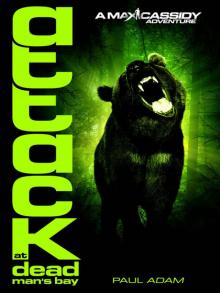 Attack at Dead Man's Bay
Attack at Dead Man's Bay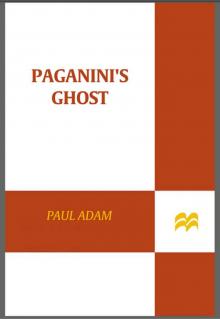 Paganini's Ghost
Paganini's Ghost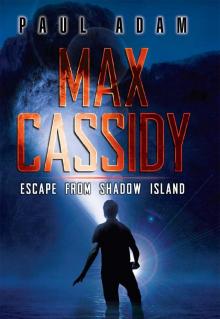 Escape from Shadow Island
Escape from Shadow Island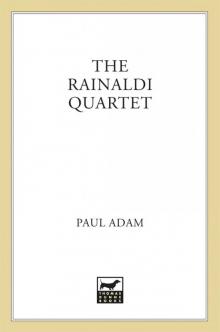 The Rainaldi Quartet
The Rainaldi Quartet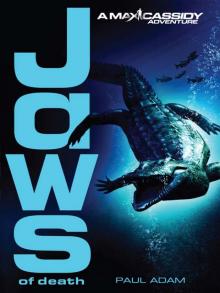 Jaws of Death
Jaws of Death